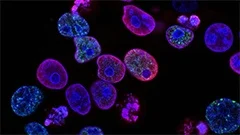Introduction
The cell cycle is a series of events that take place in a cell leading to its division and duplication, resulting in two daughter cells. This process is fundamental for the growth and development of organisms, as well as tissue repair and homeostasis. In this course, we will delve into the intricacies of the cell cycle, its regulation, checkpoints, and the consequences of aberrations in this process.
Overview of the Cell Cycle
The cell cycle can be divided into four distinct phases: G1 phase (First gap phase), S phase (Synthesis phase), G2 phase (Second gap phase), and M phase (Mitosis phase). Each phase represents a specific stage in the cell's growth and preparation for division.
G1 Phase
The G1 phase is the first phase of the interphase, which is the period between two consecutive cell cycles. During this phase, the cell grows in size, synthesizes proteins, and increases its DNA content to prepare for DNA replication in the S phase. The duration of the G1 phase can vary significantly depending on the cell type and its needs.
S Phase
The S phase is the phase of DNA replication. During this phase, the cell duplicates its chromosomes to ensure that each daughter cell receives a complete set of genetic information. DNA replication occurs semi-conservatively, meaning that each new DNA molecule contains one strand from the original and one newly synthesized strand.
G2 Phase
The G2 phase is the second gap phase of the interphase. During this phase, the cell continues to grow in size, completes the synthesis of proteins required for mitosis, and ensures that its DNA is accurately replicated and properly packaged into chromosomes. The cell then proceeds to the M phase if it has passed all checkpoints.
M Phase
The M phase is the phase of mitosis, during which the cell divides itself into two daughter cells. Mitosis can be divided into four stages: prophase, metaphase, anaphase, and telophase. In addition to mitosis, cytokinesis also occurs during the M phase, resulting in the physical separation of the two daughter cells.
Checkpoints and Regulation of the Cell Cycle
The cell cycle is tightly regulated to ensure that cells divide correctly and at the appropriate time. This regulation occurs primarily through checkpoints, which are points during the cell cycle where the cell checks its readiness for progression. If a cell encounters problems or stresses during one phase, it may temporarily halt its progression to allow time for repair or adaptation before proceeding to the next phase.
Consequences of Aberrations in the Cell Cycle
Aberrations in the cell cycle can lead to various outcomes, such as uncontrolled cell growth (cancer) or cell death (apoptosis). Understanding the mechanisms that regulate the cell cycle and the consequences of its dysregulation is crucial for developing strategies to combat cancer and maintain tissue homeostasis.
Conclusion
The cell cycle is a complex, yet fundamental process that underlies growth, development, repair, and homeostasis in all organisms. Understanding this process can provide valuable insights into the mechanisms of disease and potential therapeutic targets.
MCQ: Test your knowledge!
Do you think you know everything about this course? Don't fall into the traps, train with MCQs! eBiologie has hundreds of questions to help you master this subject.
To go further...
These courses might interest you
Create a free account to receive courses, MCQs, and advice to succeed in your studies!
eBiologie offers several eBooks containing MCQ series (5 booklets available free for each subscriber).








